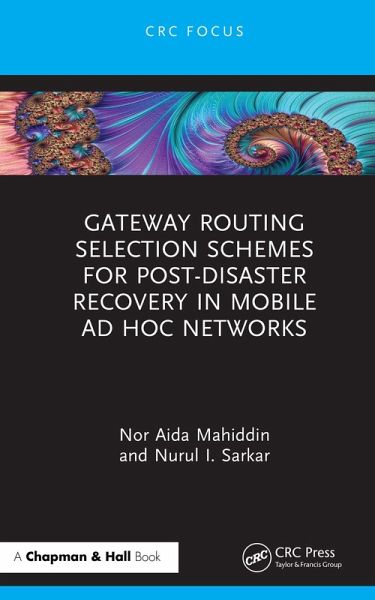
Gateway Routing Selection Schemes for Post-Disaster Recovery in Mobile Ad Hoc Networks (eBook, ePUB)

PAYBACK Punkte
12 °P sammeln!
Gateway Routing Selection Schemes for Post-Disaster Recovery in Mobile Ad Hoc Networks bridges the gap by providing practical guidelines for an efficient design and performance evaluation of gateway selection schemes to manage load balancing. This book provides both a theoretical background and a practical evaluation of gateway selection methods using simulation methodology. Provides good coverage in a single text on a performance evaluation of gateway routing selection schemes for post-disaster recovery Offers students, teachers, and researchers both theoretical and practical knowledge of sys...
Gateway Routing Selection Schemes for Post-Disaster Recovery in Mobile Ad Hoc Networks bridges the gap by providing practical guidelines for an efficient design and performance evaluation of gateway selection schemes to manage load balancing. This book provides both a theoretical background and a practical evaluation of gateway selection methods using simulation methodology.
Gateway Routing Selection Schemes for Post-Disaster Recovery in Mobile Ad Hoc Networks makes the teaching, learning, and researching of gateway routing selection schemes a more active process by using practical tools and exercises.
- Provides good coverage in a single text on a performance evaluation of gateway routing selection schemes for post-disaster recovery
- Offers students, teachers, and researchers both theoretical and practical knowledge of system design and performance validation
- Enhances teaching and learning and research capability in gateway routing selection schemes
- Begins each chapter with a set of learning objectives and provides chapter summaries as well as review questions
- Provides illustrations, mini-projects, and a list of acronyms
Gateway Routing Selection Schemes for Post-Disaster Recovery in Mobile Ad Hoc Networks makes the teaching, learning, and researching of gateway routing selection schemes a more active process by using practical tools and exercises.
Dieser Download kann aus rechtlichen Gründen nur mit Rechnungsadresse in A, B, BG, CY, CZ, D, DK, EW, E, FIN, F, GR, HR, H, IRL, I, LT, L, LR, M, NL, PL, P, R, S, SLO, SK ausgeliefert werden.



